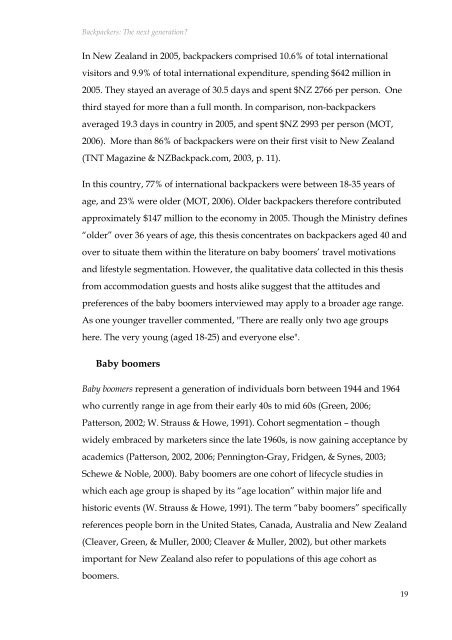Backpackers: The next generation? - Scholarly Commons Home
Backpackers: The next generation? - Scholarly Commons Home
Backpackers: The next generation? - Scholarly Commons Home
Create successful ePaper yourself
Turn your PDF publications into a flip-book with our unique Google optimized e-Paper software.
<strong>Backpackers</strong>: <strong>The</strong> <strong>next</strong> <strong>generation</strong>?<br />
In New Zealand in 2005, backpackers comprised 10.6% of total international<br />
visitors and 9.9% of total international expenditure, spending $642 million in<br />
2005. <strong>The</strong>y stayed an average of 30.5 days and spent $NZ 2766 per person. One<br />
third stayed for more than a full month. In comparison, non-backpackers<br />
averaged 19.3 days in country in 2005, and spent $NZ 2993 per person (MOT,<br />
2006). More than 86% of backpackers were on their first visit to New Zealand<br />
(TNT Magazine & NZBackpack.com, 2003, p. 11).<br />
In this country, 77% of international backpackers were between 18-35 years of<br />
age, and 23% were older (MOT, 2006). Older backpackers therefore contributed<br />
approximately $147 million to the economy in 2005. Though the Ministry defines<br />
“older” over 36 years of age, this thesis concentrates on backpackers aged 40 and<br />
over to situate them within the literature on baby boomers’ travel motivations<br />
and lifestyle segmentation. However, the qualitative data collected in this thesis<br />
from accommodation guests and hosts alike suggest that the attitudes and<br />
preferences of the baby boomers interviewed may apply to a broader age range.<br />
As one younger traveller commented, "<strong>The</strong>re are really only two age groups<br />
here. <strong>The</strong> very young (aged 18-25) and everyone else".<br />
Baby boomers<br />
Baby boomers represent a <strong>generation</strong> of individuals born between 1944 and 1964<br />
who currently range in age from their early 40s to mid 60s (Green, 2006;<br />
Patterson, 2002; W. Strauss & Howe, 1991). Cohort segmentation – though<br />
widely embraced by marketers since the late 1960s, is now gaining acceptance by<br />
academics (Patterson, 2002, 2006; Pennington-Gray, Fridgen, & Synes, 2003;<br />
Schewe & Noble, 2000). Baby boomers are one cohort of lifecycle studies in<br />
which each age group is shaped by its “age location” within major life and<br />
historic events (W. Strauss & Howe, 1991). <strong>The</strong> term “baby boomers” specifically<br />
references people born in the United States, Canada, Australia and New Zealand<br />
(Cleaver, Green, & Muller, 2000; Cleaver & Muller, 2002), but other markets<br />
important for New Zealand also refer to populations of this age cohort as<br />
boomers.<br />
19

















